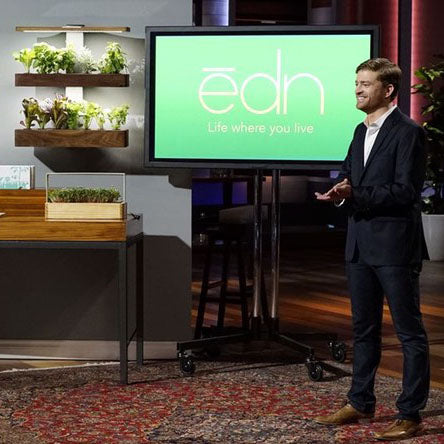
Written By Becky Wade
Ryan Woltz knows a thing about growth.
If you caught the recent episode of ABC’s Shark Tank, you saw him skillfully showcase the ēdn SmallGarden—an intelligent indoor planter that doubles as a conversation-starting piece of art—while defending himself against the ruthless Sharks. In many ways, the show was Ryan’s coming-out moment, his introduction of his company to the world- but ēdn's seeds were planted much, much earlier.
A Budding Horticulturist
Ryan’s interest in horticulture took root at six years old, when he discovered the thrill of backyard gardening and forest exploring. Though he couldn’t vocalize it then, the concept of living beings growing on their own—no instructions required, human assistance optional—fascinated him.
That childlike wonder stuck with him through his teenage years and beyond. When his family moved from Pittsburgh, Pennsylvania to Charleston, South Carolina, he fused his love of the outdoors with his burgeoning social life, spending countless hours at the beach near his home and devoting much of his free time to sports with his friends. Later, at Clemson University, Ryan saw in Civil Engineering the opportunity to pursue his passions for nature, the outdoors, and problem-solving at once. He took the plunge and nearly drowned as a result; it took three tries to pass an introductory math class. After a lifetime of cruising by on minimal effort, that was the wakeup call he needed. With a crucial mindset pivot—“fine being average” to “I’m going to be great”—Ryan’s narrative as a leader began to develop. By the time he graduated, he’d been elected President of his fraternity, started a newspaper, and established t-shirt and ice luge business, all while acing tough classes like Differential Equations that once seemed insurmountable.
The ēdn Evolution

Though Ryan emerged from Clemson as an engineer, horticulture was still an important part of his identity. In fact, it was in his first year at a big construction and engineering firm that the idea of an automated garden was planted. He became so fixated that a year and a half into the job, on his twenty-fifth birthday, Ryan quit, sold his belongings, bought a car (Uber-approved, just in case), and recruited a friend from Clemson to join him in Denver to bring the garden concept to life.
If his business schemes in college were akin to hiking one of Colorado’s 14’ers, Ryan soon discovered that making a living as a startup founder was on par with scrambling up K2. As that reality set in and the stress mounted, his co-founder crumbled and bowed out of the company—on the eve of their first big competition, no less. Reverting to his high school wrestling days, in which he relished being an underdog, Ryan saw the split as a challenge and single-handedly bested five other companies before a 400-person audience.
Back to square one, Ryan took jobs at Uber and one more engineering firm while planning his next move. In a giant stroke of luck, a call for Denver Startup Week’s pitch competition crossed his radar the night before applications were due, and with nothing to lose, Ryan filled one out. His acceptance caught him by surprise just a few days before the battle, which would take place in the form of one-minute prop-less pitches given by the eight invited companies. Despite less than ideal preparation—including a last-minute work trip to Texas and a total failure to recite his pitch in the rehearsal—Ryan pumped the crowd up, nailed his allotted minute, and ended the night second overall. His confidence soared while ēdn’s exposure skyrocketed, and opportunities came hurling Ryan’s way: first a series of introductions to big players in the industry; then a successful pitch to Angel Investors in California; and finally a coveted interview with TechStars, the incubator and accelerator that has helped develop the likes of ClassPass, Sphero, Uber, and more.

The TechStars Experience
Ryan’s invitation to the three-month TechStars program changed everything. Upon accepting and leaving his traditional job for good, he was challenged to get five working prototypes of his automated garden into five homes. To his amazement, he did, and all of a sudden, ēdn was transformed from a well-developed idea into a physical product—flawed and “way too complicated,” but real nonetheless. Even more influential than the assignments and lessons, however, were the people that surrounded Ryan in the TechStars space: “the smartest, most creative people you’re ever met,” all of whom subscribed to the “Give First” motto and who raised each other’s game through shared inertia.

One of Ryan’s most fortuitous connections spawned by TechStars was JP O’Brien, a serial entrepreneur and the CEO of sports tech accelerator and incubator Black Lab Sports. The two met through Mentor Madness—a speed-dating-type situation between the TechStars entrepreneurs and 100 potential mentors—and formed a quick bond through their engineering orientations and athletic backgrounds, which still inform the way each operates. (Ryan was a competitive high school wrestler and O'Brien, now a coach, played lacrosse and football at Cornell.)
Ryan thrived in the TechStars system, largely thanks to mentors like O'Brien and Managing Director Natty Zola. But the process didn’t happen without growing pains. Another stumbling block impeded his path at possibly the most inconvenient event yet: Demo Day, the highly public and anticipated annual TechStars finale. An untimely falling-out with his latest co-founder left Ryan alone and petrified on the eve of their presentation. Backstage, 800 audience members waiting to meet ēdn, Ryan envisioned himself totally bombing his demonstration and did something he'd never done before: bailed. Not only did he blow the “Super Bowl of TechStars,” in his words, he “hadn’t even shown up.”

Six Sharks and One Black Lab
Then the call from Shark Tank came. Abiding by his belief that “it’s all about how you pick yourself up,” Ryan went through the interview process while continuing to push along the garden. All the while, O'Brien continued mentoring and guiding him, at one point challenging Ryan to design a smaller, more cost-effective product that could go to market sooner, more along the lines of a Shark Tank hit. The SmallGarden—a gorgeous and sleek planter box equipped with wooden panels, an automatic lighting system, and 12 soil-less seed pods—was the result. O'Brien also drilled Ryan into the ground in preparation for the show, anticipating the hard questions he might face and training him to remain composed throughout. By the time he landed in Culver City, California, for the taping of the show, Ryan had successfully crafted two striking gardens and a dynamite demonstration.
Without spoiling the outcome, ēdn entered a new phase after the Shark Tank appearance, and again when the episode aired six months later. In between, Ryan planted the ēdn headquarters in the next environment in which he felt the company would flourish: Black Lab Sports, O'Brien's Boulder-based intersection of business, art, and athletics. Not only has the move allowed him to integrate the entire process, from research and design to prototyping to assembly to manufacturing, in his words, it’s a “creative collective of people who do things"—things like create and troubleshoot and encourage and grow.








